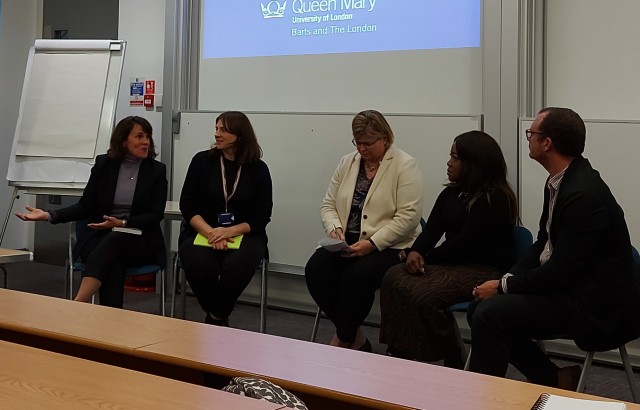Queen Mary hosts tackling placed-based health inequalities panel with local council representatives
Queen Mary academics and representatives from two East London councils came together to discuss tackling place-based health inequalities in the local community.

Dr Megan Clinch and Dr Vanessa Apea from the Wolfson Institute of Population Health were joined by Dr Jason Strelitz, Director of Public Health in the London Borough of Newham, and Cllr Rachel Blake, a Local Councillor for Bow East in Tower Hamlets. The panel was chaired by Professor Alison Blunt, Deputy Vice-Principal for Impact at Queen Mary.
Health inequalities are defined by the NHS as “unfair and avoidable differences in health across the population, and between different groups within society”[1]. Many of our local population in East London experience these inequalities and can expect to spend longer living in poor health as a result. On average, a female living in Newham can expect to spend a decade less in good health than her counterpart in Kensington and Chelsea. For males living in Hackney, this gap widens to nearly 13 fewer years in good health than their peers in Richmond[2].
The panel discussed the need to take a holistic approach to tackling these health inequalities, many of which are underpinned by wider issues such as housing quality and income. In a clinical setting, professionals need to ask the right questions to get a fuller picture of their patients’ lives beyond the snapshot seen in an appointment. This will enable healthcare staff to understand their patients’ needs and build trust so that they can offer the most effective support.
When asked about the importance of place, panellists spoke about the accountability that comes with delivering services within a particular geography. A shared identity or affiliation with a place can also be very empowering for citizens. This does not mean that there is only one experience of living in a local area: different heritage groups may have very different experiences, so it is vital that we do not make assumptions about their priorities and needs.
Taking a place-based approach in research means acknowledging that what works in one context might not work in another. Collaborative working between local authorities and communities can help to focus research questions on issues that matter most to residents. With many local services under pressure, we need to ensure that new initiatives are accessible to the community and feasible to deliver within the limited resources available. This will involve taking time to understand the relative relevance of patients’ concerns, instead of assuming that the barrier to accessing care is a lack of information.
The event was co-hosted by the Lifelong Health research theme within the Faculty of Medicine and Dentistry (led by Professor Sian Henson and Dr Li Chan) and the Mile End Institute (led by Professor Patrick Diamond). By promoting collaboration across academic disciplines, they hope to identify new approaches to tackling health inequalities in East London.
Professor Sir Mark Caulfield, Vice Principal for Health at Queen Mary University of London, said: “As the Faculty of Medicine and Dentistry, we have a clear and ambitious mission: we want to achieve better health for all through our research and education. The impact of our work extends globally, but we have a particular commitment to our local population in East London. I hope that today’s event will be the start of many more conversations on this important topic.”
Related items

24 February 2025
